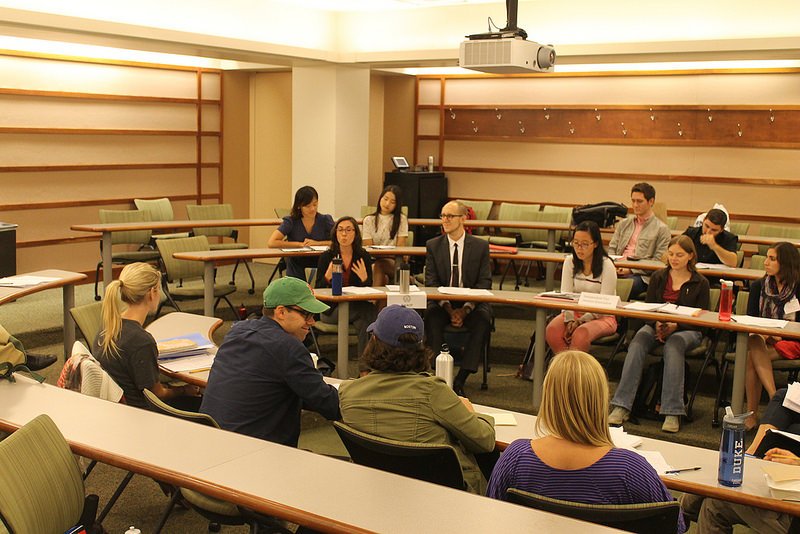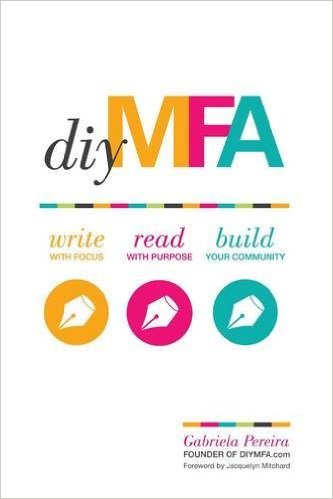
Today’s guest post is an excerpt from DIY MFA by Gabriela Pereira (@DIYMFA), just released from Writer’s Digest Books.
Most writers want an MFA for one of three reasons: They want to teach writing, they want to get published, or they want to make room in their life for writing. It turns out these reasons for doing an MFA are actually based on myths.
Myth 1: You Need an MFA to Teach Writing
Many writers get the MFA because they think it will allow them to teach writing at the college or graduate level. Once upon a time this might have been the case, but these days so many MFA graduates are looking for jobs and so few teaching positions exist, that it’s a challenge to get a teaching job with a PhD, much less with a terminal master’s degree. The writers who do manage to snag a coveted teaching position are often so overwhelmed with their responsibilities that they have to put their own writing on the back burner. While in the past an MFA may have served as a steppingstone to becoming a professor, it’s not the case anymore.
More important, many teachers in MFA programs do not have that degree themselves. Some professors are successful authors with prominent careers, while others are publishing professionals who bring the industry perspective to the courses they teach. This goes to show that the MFA has little impact on a writer’s ability to teach writing. Being a successful author or publishing professional is much more important.
Myth 2: The MFA Is a Shortcut to Getting Published
No agent will sign you and no editor will publish your book based on a credential alone. You have to write something beautiful. If you attend an MFA program and work hard, you will become a better writer. And if you become a better writer, you will eventually write a beautiful book. An MFA might help you on your quest for publication, but it’s certainly not required. After all, many writers perfect their craft and produce great books without ever getting a degree.
Ultimately getting published is a matter of putting your backside in the chair and writing the best book possible. For that, you don’t need an MFA.
Myth 3: An MFA Program Will Force You to Make Writing a Priority
If you can find time to write only by putting your life on hold and plunging into a graduate program, then your writing career isn’t going to last very long. Only a small percentage of writers can support themselves and their loved ones through writing alone. This means you must find a balance between your writing and the rest of your life.
Even within your writing career, you must become a master juggler. Forget that glamorous image of the secluded writer working at his typewriter. These days, writing is only a small piece of the writer’s job. In addition to writing, you must promote your books, manage your online presence, update your social media … and likely schedule these tasks around a day job, a family, and other responsibilities.
The danger with MFA programs is that they train you to write in isolation but don’t always teach you how to fit writing into your real life, or even how to juggle writing with all the other aspects of your writing career. Not only that, but external motivators like class assignments or thesis deadlines don’t teach you to pace yourself and build up the internal motivation you need to succeed in the long-term.
Genre Writing in MFA Programs
Most MFA programs focus on literary fiction, creative nonfiction, and poetry. While these are noble areas of literature, they cover only a tiny slice of the wide and diverse world of writing. Heaven forbid a writer in a traditional MFA program produces something commercial—or worse, genre fiction. While a handful of MFA programs allow writers to study genre fiction or children’s literature, the majority still focus on literary work alone. If you want to write genre fiction, commercial nonfiction, or children’s books, you likely will not learn much about them in your MFA courses.
Writers of genre and commercial fiction are among the most dedicated, driven writers I know. They take their craft seriously and work hard to understand the business side of the publishing industry. In addition, a vast number of associations, conferences, and guilds are dedicated to specific genres or commercial writing. Literary writers are not the only ones who crave knowledge and community. Commercial and genre writers want it, too.
This is why I created DIY MFA: to offer an alternative for writers who do not fit the strict literary mold of the traditional MFA system.
Should You Pursue an MFA?
MFA programs are not a bad thing. In fact, they are exceptional at serving a small and very specific group of writers. If you write literary fiction, creative nonfiction, or poetry, and if you thrive in a formal academic environment, then the traditional MFA is a great option. If you can afford the tuition without taking out loans, and if you have the time to make the most of the experience, then you are one of those ideal candidates for graduate school.
One reason I am extremely grateful for my own MFA is that it gave me the opportunity to work with several phenomenal teachers. I studied YA and middle-grade literature with the brilliant David Levithan. The legendary Hettie Jones was my first workshop teacher. I worked closely with Abrams publisher Susan Van Metre, who served as my thesis advisor and mentor. These experiences were invaluable, and at the time I didn’t think I could make connections with such literary luminaries any other way. Now I know, however, that you can make connections and find great mentors without attending an MFA program.
The “Do It Yourself” MFA
As an MFA student, I discovered the magic equation that sums up just about every traditional MFA. The Master in Fine Arts degree in Creative Writing is nothing more than a lot of writing, reading, and building community. In the workshops, you exchange critiques with other writers and work toward a manuscript that becomes your thesis project. Most programs also require you to take literature courses both in and outside your chosen area of literature. Finally, you are asked to attend readings or talks by other writers—to build your personal writing community. To create a personalized, do-it-yourself MFA, you have to find a way to combine these three elements.
Write with focus. You have to commit to a project and finish it. In traditional MFA terms, this project is your thesis, and it’s a crucial part of your development as a writer. But you don’t need to complete a thesis to get this experience; you just need to finish and polish a manuscript. While you can feel free to play and explore early on, you must eventually choose a project and see it through from beginning to end. When you write with focus, you write with a goal in mind.
Read with purpose. This means reading with a writer’s eye. If you’re like me, you were a bookworm long before you could hold a pencil in your hand. Writers love books. In fact, many of us become writers so we can create the very books we love to read.
Reading for pleasure is wonderful, and it certainly has its place. Reading with purpose is different: It is reading in a way that serves our writing. It’s not just about finding out what happens in the story; it’s about learning how the author pulls it off. Reading this way isn’t just an intellectual exercise. When we read with purpose, we examine how an author crafts a story so we can emulate those techniques in our own work.
Build your community. In the traditional MFA, building a community happens organically. You meet fellow writers in your workshops and literature courses. You go to readings and conferences to connect with authors. You attend a publishing panel and learn about the industry. The community element is baked into the MFA experience.
 When working on your own it takes more effort, but you will learn how to find critique partners and fellow writers to support you on your journey. You’ll discover conferences and associations that will help you navigate the publishing industry and the business side of writing. Finally—and perhaps most important—you will also learn ways to find and connect with your readers.
When working on your own it takes more effort, but you will learn how to find critique partners and fellow writers to support you on your journey. You’ll discover conferences and associations that will help you navigate the publishing industry and the business side of writing. Finally—and perhaps most important—you will also learn ways to find and connect with your readers.
To learn more about crafting your own customized MFA experience, sign up for the DIY MFA newsletter, and check out the new book, DIY MFA.
Gabriela Pereira is the Creative Director at DIY MFA, the do-it-yourself alternative to a master’s degree in writing. She develops tools and techniques for the serious writer, to help you get the knowledge without the college. With an MFA in creative writing, Gabriela is also a freelance writing teacher, and has led workshops throughout New York City via writing programs like: 826NYC, East Harlem Tutorial Program and Everybody Wins. When she’s not working on DIY MFA, she loves writing middle grade and teen fiction, with a few short stories for “grown-ups” thrown in for good measure.

[…] Today’s guest post is an excerpt from DIY MFA by Gabriela Pereira (@DIYMFA), just released from Writer’s Digest Books. Most writers want an MFA for one of three reasons: They want to teach writing, they want to get published, or they want to make room in their life for writing. It turns out these reasons … […]
I find screenwriting programs to be more honest with respect to story telling.
So true, I did a screen writing module in my degree. It was easy, fun and clear to write a script. So weird!
THANK YOU! I needed this. I occasionally doubt myself and my future success possibilities because of my lack of an MFA. I’ve been gradually letting that notion go, and this helps!
Also, I’m not interested in social media with exception of using Twitter as a news aggregator. From my perspective it’s an unwanted hassle. I write fiction and have neither the time nor inclination for blog posts or podcasts, but I do understand the nature of the disadvantage this might impose. And I think reality reliably informs us a social media presence is not necessarily mandatory to find success.
[…] view post at https://janefriedman.com/mfa-creative-writing-3-myths/ […]
[…] 3 Myths About the MFA in Creative Writing (Jane Friedman) Most writers want an MFA for one of three reasons: They want to teach writing, they want to get published, or they want to make room in their life for writing. It turns out these reasons for doing an MFA are actually based on myths. […]
[…] to the rest at Jane Friedman and thanks to Matthew for the […]
[…] the program could help build contacts, at the very least. Here is an article by Jane Friedman with 3 Myths About the MFA in Creative Writing to help answer some of the […]
[…] Jane Friedman […]
[…] Honoree Corder’s Website Removed by S.J. Pajonas How Do You Like Them Apples! MFA: Myths for Authors Write, Camera, Action! DRM Drama Audio on the Go Singles’ Night (1) Singles’ Night (2) Swan […]